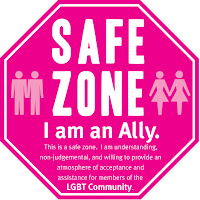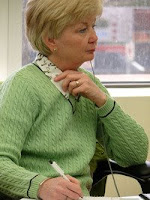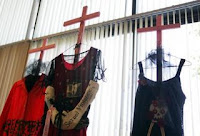The rape resistance 'backpack'
 Krista Warnke is the public education co-ordinator at SACHA (Sexual Assault Centre, Hamilton & Area), and she spends much of her time in local high schools talking to teens about dating violence and date rape.
Krista Warnke is the public education co-ordinator at SACHA (Sexual Assault Centre, Hamilton & Area), and she spends much of her time in local high schools talking to teens about dating violence and date rape.
May has been Sexual Violence Awareness Month.
One in four women will be raped at some point in their lives. In Canada, a woman is raped every 17 minutes. Most perpetrators are known to the victim and date rape accounts for the majority of reported sexual assaults.
What is rape resistance?
It is more accurate to talk about rape resistance. The term rape "prevention" misleads women.
First, it gives women the false message that there is a way to "prevent" sexual assault from happening. There is no such guarantee.
Secondly, traditional "rape prevention" information leads women to believe that they are responsible for preventing sexual assault. Our culture encourages women to be careful about what they wear or what they do in order to stop it from happening. The focus is on women and, as a result, many survivors of sexual assault end up blaming themselves. Offenders, however, are always 100 per cent responsible.
What is the backpack?
All women wear a rape resistance "backpack." They have learned the do's and don'ts of rape resistance since childhood and have been collecting them in their backpacks.
"Don't go out alone at night" or "walk with your keys in your hand" or "wear shoes you can run in" are some of the many examples women are familiar with.
Many of these so-called "safety tips," however, focus on assault by a stranger in an outdoor location. And yet, most women are sexually assaulted by someone they know in their own home. The information is incomplete.
Many of the strategies cost money. Deadbolt locks, bars on the windows, personal alarms or security systems can be expensive. Some women who work shifts, have no choice but to be out by themselves at night. Many cannot afford cars or taxis. Women with less money have fewer options and, therefore, less access to safety.
On the one hand, the backpack is necessary. When women sense danger, they have some strategies to choose from.
On the other hand, the backpack weighs women down and restricts their freedom. All women, to some degree, carry this burden.
So, women make decisions. There are no right or wrong answers. Whether women use all of their backpacks or none, it is never their fault.
Rather than blaming the victim, we should help women to recognize the warning signs of a potentially abusive dating partner.
- Using threats: making threats to harm someone; threatening to leave, to commit suicide.
- Using intimidation: making someone afraid by using looks, actions, gestures; smashing things; abusing pets.
- Using emotional abuse or anger: putting someone down; name calling; playing mind games.
- Using isolation or exclusion: controlling what someone does, who they see and talk to, what they read, where they go; using jealousy to justify actions.
- Minimizing, denying and blaming: making light of the abuse and not taking someone's concerns about it seriously; saying the abuse didn't happen; saying the other person caused it.
- Using peer pressure: threatening to expose someone's weakness or to spread rumours; telling lies about them to their friends.
- Using male privilege: treating her like a servant; acting like the "master of the castle"; being the one to define male and female roles.
- Using sexual coercion: manipulating or pressuring her to have sex; getting her drunk or drugging her to have sex; refusing to use birth control or safe sex precautions.
Unfortunately, most of these behaviours are supported by traditional gender roles. Some women, therefore, are unable to recognize them as warning signs and accept them as a "normal" part of an intimate relationship. With accurate information, however, this pattern can change.
Education works. Support Sexual Violence Awareness Month by sharing this information and educating others. It will make a difference.
Krista Warnke writes on behalf of the education and events committee of the Woman Abuse Working Group.
The Strategies
- In general
- Use your backpack when and if you can. Remember, though, that if an assault happens it doesn't mean that you did something wrong.
- Fighting back is an individual choice.
- On the street
- Wear clothes & shoes you can run in.
- Walk in well-lit & heavily trafficked areas.
- If a threatening car approaches, turn and walk the other way.
- In Your Home
- Change locks from the previous resident.
- Stand near the emergency button on an elevator.
- Ask for I.D. from an unexpected caller.
- On A Date
- Listen to that "icky" feeling in your gut.
- Be assertive: cross your arms, square your shoulders, look them in the eye.
- If force is used, say the word "rape."
- In An Intimate Relationship
- Have spare money ready to use.
- If you leave, take your children with you; try to bring I.D., medication, house keys, emergency clothing, special toys, or ...
- Leave a packed bag with someone you trust.
- In A Bar
- Get your own drinks from servers you trust.
- Try to keep an eye on your drink.
- Plan ahead: talk to your friends and figure out what you will do if you think someone has been drugged.
- In Your Car
- Check the back seat before entering.
- Lock the doors & keep windows rolled 3/4 up.
- Keep the gas tank at least 1/2 full so you can drive to safety if you're being followed.
- If You Are Sexually Assaulted
- Go to a safe place.
- Call a Sexual Assault Centre's 24-hour, confidential crisis/support line .
- Get the medical attention you need.
- Decide if you want to report to the police.
- For more information, contact SACHA at sacha@sacha.ca or http://www.sacha.ca/




















































